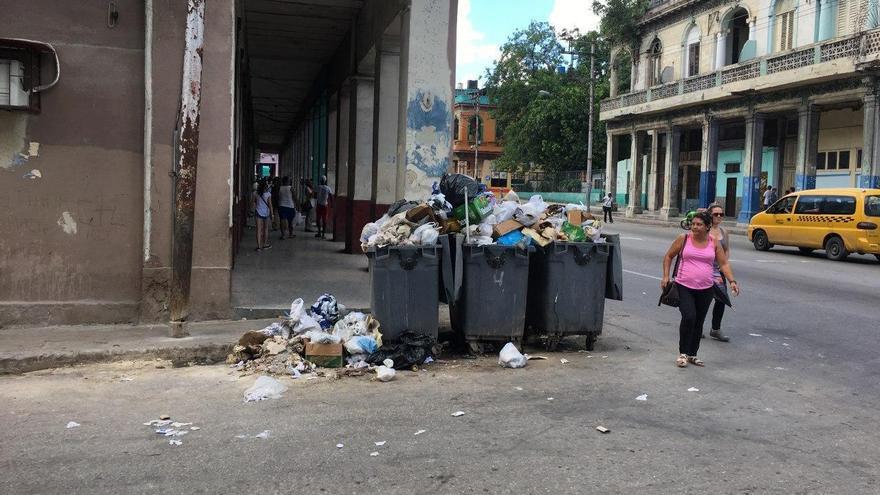
![]() 14ymedio, Zunilda Mata, Havana, 29 February 2020 — Over the weekend the inhabitants of the capital have learned about the existence of the “popular movement for a more beautiful, clean and healthy Havana.” The initiative, which goes into effect on March 1, has been presented as coming “from the community,” but it has emerged from the offices of the provincial government and the support of its corresponding “factors”: that is the Party, the Committees for the Defense of the Revolution, the Federation of Cuban Women and the Association of the Veterans of the Cuban Revolution.
14ymedio, Zunilda Mata, Havana, 29 February 2020 — Over the weekend the inhabitants of the capital have learned about the existence of the “popular movement for a more beautiful, clean and healthy Havana.” The initiative, which goes into effect on March 1, has been presented as coming “from the community,” but it has emerged from the offices of the provincial government and the support of its corresponding “factors”: that is the Party, the Committees for the Defense of the Revolution, the Federation of Cuban Women and the Association of the Veterans of the Cuban Revolution.
The declared inspiration on which the movement is based has been the alert launched by the President of the Republic, Miguel Díaz-Canel, last December, when, in front of the deputies of the National Assembly, he asked the following question: What good are the works undertaken to celebrate Havana’s 500th anniversary, if the hygiene of the city disappears again among mountains of garbage?
Rhetoric aside, the truth is that Havana has earned the reputation of being the dirtiest and most smelly city in the whole country and the formula by which it is intended to sanitize it, or better yet to discipline it, will not be, as might be supposed, appealing to the love of citizens for their capital, but imposing a severe inspection system backed by fines 30 to 60 times higher than those applied until February 29 of this year.
For example, the fines for throwing papers or garbage on public roads outside the trash cans will be 50 to 300 pesos instead of five pesos.
Whoever throws away household garbage in the containers at times other the new established schedule from 6 pm to 10 pm risks fines of up to 1,500 pesos. Anyone placing debris outside the points defined by the Popular Councils will be fined 3,000 pesos (well over than 3 months average wages). Those who do not request permission to carry out works that affect the sidewalks or public roads and do not return everything to its original state will be forced to pay a fine of up to 2,500 pesos.
Among the group of new measures is also the obligation of each state or social entity to take charge “of the sanitation and permanent beautification of its establishments, including its perimeter environment.”
Reinier Arias, deputy director general of the Directorate of Community Services, explained to the official press that the reason why the level of fines had been increased was because “they were very low,” which led to indifference to the hygiene measures of the city.
The official stressed that there are now new trucks, including “three donations from Japan, Austria and China, with more than 200 pieces of equipment at a value exceeding $ 30 million,” which, according to him, allows a better condition of response. In addition, this activity is being granted special access to fuel, which allows collecting and transporting the 23,800 cubic meters of waste generated daily by the more than two million inhabitants of Havana, plus a “floating population” every day of around 500,000 people.
The neighborhood assemblies where these new measures were announced were conducive to people’s raising old problems related to garbage dumpsters that nobody deals with eliminating: streets with “historic” potholes; broken pipe mains that flood the streets with filth; a shortage of resources to repair the houses; and a whole rosary of calamities that, as defined by a neighbor of the Buena Vista neighborhood in the municipality of Playa, would need “another type of popular movement to make people’s lives more dignified.”
_________________
COLLABORATE WITH OUR WORK: The 14ymedio team is committed to practicing serious journalism that reflects Cuba’s reality in all its depth. Thank you for joining us on this long journey. We invite you to continue supporting us by becoming a member of 14ymedio now. Together we can continue transforming journalism in Cuba.
